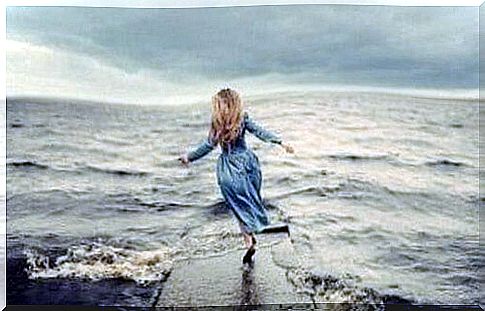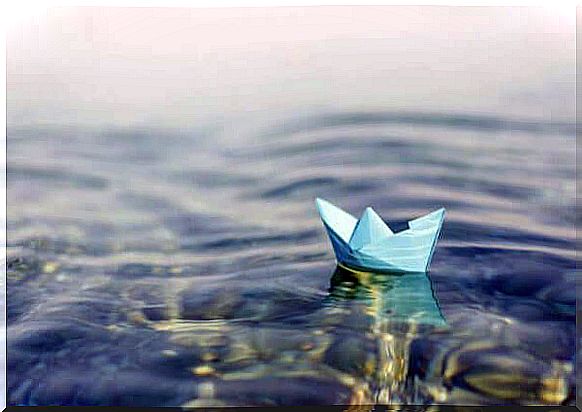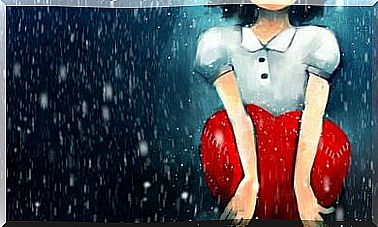I Need Help: I’m Tired Of Rowing Alone

I need help. I’m tired, I’m at the limit of my strength. I’m tired of rowing alone, of pretending to do it when it doesn’t. I need a life jacket, a helping hand that can and wants to guide me. Because there are moments like this, those in which you have no other option than to solicit support, to accept help that allows us to face our problems from another perspective.
They say that all unhappy people have something in common: bitterness. However, not all bitterness has the same prominence or the same background. There are those who do just this malaise, to the point of normalizing it: they continue to swallow this unhappiness until they accumulate many stones. They are those of remorse, resentment, bad mood and distorted thoughts that feed, as wood does with fire, malaise.
In these cases, asking for help is perceived as an outrage, a sign of weakness. Because there are people who project responsibility onto others, waiting for them to guess what happens to them and to act accordingly. On the other hand, and fortunately, we also find those who take the step and have the courage to say I need help . Because remaining silent and enduring has its limits: although perhaps it is easier to offer than to receive, there are times when it is necessary to ask for help .

I need help, I have reached the limit
Albert Ellis, a well-known cognitive psychotherapist, developed what we know today as Rational Emotional Therapy during the 1950s. There is one aspect within this approach that is worth remembering. We often fall into states of complete helplessness and despair, thinking that life cannot treat us worse. We feel like a paper boat that always goes adrift. However, just as Ellis himself would say, ” it is not the events that cause the emotional distress, but the way we interpret them. “
Being able to count on someone capable of making us understand this is undoubtedly the best resource. We all know it’s not easy to say out loud I need help . How to do it then? As a rule, the following happens: Those who need help most are more reluctant to ask for it.
Those who need more help are also those who are more used to giving it, not receiving it. So when we finally push ourselves beyond this line and claim the right to be heard, assisted and supported, we do so because we can’t take it anymore. Because we have reached the limit.
What clues mean it’s time to ask for help?
It is not necessary to reach this limit, to this frontier where broken goes by now, before asking for the help of a psychologist. How are we managing our reality? If this is beyond our control, there are few clear clues. However, let’s see a few that can be helpful in avoiding hitting this limit.
- We live everything in an intense and immeasurable way. A simple mistake becomes something fatal; the bad mood can last for days or weeks. A disappointment stops us, the unexpected overwhelm us …
- We can’t get certain things, ideas, memories, sensations out of our minds. All these images and thoughts come to interfere with our daily tasks and duties.
- We experience recurring headaches, digestive and muscle problems, suffer from insomnia or sleep too much.
- The activities we enjoyed have lost all their meaning and interest.
- We stopped being productive at work.
- Our interpersonal relationships are more strained. There is no shortage of phrases such as “you always take it for everything, you can’t talk to you …”. At the same time, people who really love us are openly expressing their concern for us.

What can I expect from someone who offers me help?
When we need help, we look for three things: to be understood, not to be judged by what we think or have done, that offer us resources to generate positive change. We can get something like this from a friend and family member, it will have happened to everyone on some occasion. However, there are times in life when it becomes necessary to turn to a trained professional for help.
Thanks to this psychologist trained and qualified in a series of very concrete skills:
- We will learn to look at our problems from another perspective. One where there are no walls, where we can stop seeing ourselves as victims and start perceiving ourselves as potential agents of our reality, which we can change.
- It will show us the inner realities that we do not know or perceive. They will be the agents of our self-discovery and self-knowledge.
- We don’t have to wait for a psychologist to give us advice or guidelines on what we should or shouldn’t do. A psychologist simplifies the process to enable us to find the answer to our problems, to make us the sole architects of our changes and decisions.
- It will help us alleviate suffering by gaining new perspectives for understanding and action.
- We will acquire the adequate resources to manage emotions, to avoid harmful thought patterns or to apply adequate self-control techniques.
- It will help us define our priorities, to act on them.
- It will allow us to have an attitude aimed at growth, where we can become aware of ourselves to position ourselves in the world with courage, openness and responsibility.

You have to have the courage to say out loud I need help, even if it sometimes costs a lot more than we would like. Simply making a request that satisfies this need is a big step forward.
Seeking this specialized support that allows us to initiate change may be the best decision. Because, whether we like it or not, sometimes we can’t do everything alone. There are times when a therapy becomes the best bridge to a new phase in our life .









